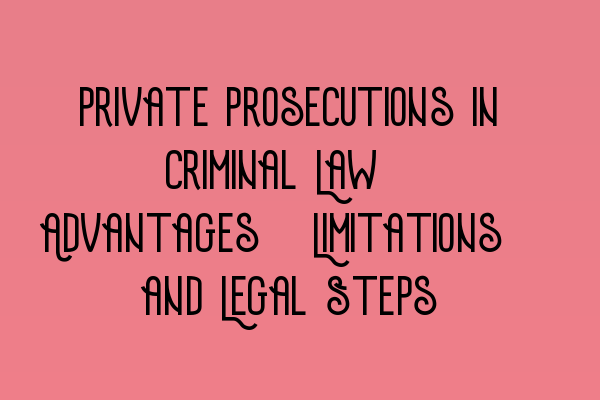Private Prosecutions in Criminal Law: Advantages, Limitations, and Legal Steps
In criminal law, private prosecutions provide individuals and organizations with the ability to initiate criminal proceedings against another party without relying solely on the prosecution authorities. This legal avenue offers a range of advantages and can be a strategic decision in certain circumstances. In this blog post, we will explore the advantages, limitations, and legal steps involved in private prosecutions.
Advantages of Private Prosecutions
Private prosecutions enable individuals and organizations to take control of the criminal process. By commencing their own prosecution, they can ensure that a matter is properly investigated and brought before the courts. Some of the key advantages of private prosecutions include:
- Justice: Private prosecutions allow victims of crime to seek justice even in cases where the prosecution authorities may not have the resources or inclination to pursue a case. This ensures that no one is above the law and that wrongdoers are held accountable for their actions.
- Speed: Private prosecutions can often be faster than waiting for the prosecution authorities to take action. This is especially crucial in complex cases where delay can result in the loss of crucial evidence or witness statements.
- Control: By initiating a private prosecution, individuals or organizations have more control over the legal proceedings. They can choose their legal representation, determine the strategy, and shape the direction of the case.
Limitations of Private Prosecutions
While private prosecutions offer several advantages, it is essential to understand their limitations. Some of the key limitations include:
- Cost: Private prosecutions can be expensive as the prosecuting party assumes all costs, including legal fees and court expenses. However, in certain cases, the court may order costs to be reimbursed if the prosecution is successful.
- Expertise: Conducting a private prosecution requires a comprehensive understanding of criminal law and procedure. It is essential to engage experienced legal professionals who specialize in criminal law to ensure the best chances of success.
- Reputation: Private prosecutions can attract media attention and scrutiny. It is crucial to consider the potential impact on personal or organizational reputation when embarking on this legal path.
Legal Steps Involved in Private Prosecutions
Initiating a private prosecution involves several legal steps. While the process can be complex, the following steps provide a general outline of the process:
1. Gathering Evidence:
The first step in a private prosecution is to gather evidence to support the allegations. This includes identifying witnesses, securing documentary evidence, and obtaining expert reports if necessary.
2. Seeking Legal Advice:
Engaging the services of an experienced criminal law solicitor is crucial for navigating the complexities of private prosecutions. They will assess the merits of the case, advise on the legal options, and guide you through the process.
3. Preparing a Case Summary:
A case summary is a document that outlines the allegations, supporting evidence, and legal arguments. This is a crucial document that sets out the case and is presented to the court to obtain their permission to proceed with the prosecution.
4. Applying to the Court:
Once the case summary is prepared, it needs to be submitted to the court, along with the appropriate application form and fee. The court will assess the application and determine whether to grant permission for the private prosecution to proceed.
5. Case Management:
If permission is granted, the case will progress to a case management hearing. This is an opportunity for both parties to present their case, identify any legal issues, and establish a timetable for the trial.
6. Trial Preparation:
Prior to the trial, both the prosecution and defense will engage in the discovery and exchange of evidence. Witness statements will be obtained, and legal arguments will be refined to present the strongest case possible.
7. Trial:
The trial is where the prosecution presents its case, calling witnesses, presenting evidence, and making legal submissions. The defense has the opportunity to challenge the prosecution’s case and present their own arguments. The judge or jury will then determine the verdict.
8. Sentencing:
If the accused is found guilty, the court will proceed to sentencing. Sentencing options can vary depending on the nature and severity of the offense.
These legal steps provide a general overview of private prosecutions, and each case may have variations depending on the specific circumstances. Engaging an experienced criminal law solicitor is crucial to ensure all legal requirements are met.
